
Lupulin Powder
Overview
Lupulin Powder is a hop product made from leaf hops, added to the wort kettle during the boiling process. It contributes to the desired bitterness of a beer as well as its characteristic hop aroma.
Lupulin Powder is suitable for use on the cold side (dry hopping) of the brewing process. It imparts a pronounced hop aroma to beer. Moreover, the high concentrations of alpha acids and hop oil in this product are advantageous for breweries adding large quantities of hops in the whirlpool.
Through the enrichment of bitter acids and essential oils, transportation and storage costs are lower for Lupulin Powder. Furthermore, beer losses can be reduced.

Specifications
- Short description
- mechanically highly enriched hop powder for (intensive) bitterness and hop flavor during wort boiling and dry hopping
- Alpha acids
- 6 - 35 %
- Beta acids
- 5 - 20 %
- Hop oils
- 1 - 10 ml/100 g
- Moisture content
- 6 - 9 %
Properties
Appearance
Lupulin Powder is a yellow-green hop powder.
Flavor
Lupulin Powder produce flavors in beer indistinguishable from those of regular pellets. Lupulin Powder provide bitterness and aroma to the beer. The flavor depends on the variety, quantity and time of addition. For further information, please refer to the hop variety data sheets.
Utilization
Given as an early kettle addition (up to 15 min after the boil begins), hop utilization normally falls within a range of 30 - 35 %. When Lupulin Powder is added late in the boil, utilization can decline to 20 % or less, depending on individual process conditions. Both additions can vary depending on the desired intensity and the beer style
Quality
All Hopsteiner® products are processed in facilities which fulfill internationally recognized quality standards.
Packaging
Our products are delivered in their respective recommended standard packaging. Alternatives may be possible upon customer request.
Standard packages of our processing plants in the USA (US) and Germany (DE) are:
- 5, 10, 90, 140 kg softpack under inert gas in 5-layer aluminum composite foils (DE)
- 20 kg soft pack under inert gas in 5-layer aluminum composite foils (US)
Usage
Dosage
The quantity of Lupulin Powder in an addition can be calculated using the alpha acid content of the powder and an estimated or known utilization. Late kettle additions of Lupulin Powder (typically 5 - 20 min prior to the end of the boil) reduce alpha acid utilization but increase hop aroma and flavor.
Application
Lupulin Powder can be added directly to the wort kettle or hop dosing vessel. Dry hopping normally involves the addition of Lupulin Powder during secondary fermentation or maturation using various techniques.
Storage
The recommended storage temperature in the original unopened packaging is < 5 °C (41 °F).
Short-term, transport-related temperature deviations do not affect product quality.
Best Before Date
Under the recommended storage conditions, the shelf life from the date of production/ packaging is at least 5 years.
Safety
Ensure good ventilation of the workplace and wear personal protective equipment. Avoid contact with eyes and skin. Do not inhale vapors or dusts. For full safety information, please refer to the relevant Hopsteiner® safety data sheet.
Analytical Methods
International approved methods listed in commitees such as ASBC or Analytica-EBC using current standards are applied.
Product analytics
- Analytica-EBC 7.4 (LCV)
- Analytica-EBC 7.5 (LCV)
- ASBC Hops-6B (LCV)
- Analytica-EBC 7.7 (HPLC)
- ASBC Hops-14 (HPLC)
- ASBC Hops-6A (Spectro)
- Analytica-EBC 7.10 (Distillation)
- ASBC Hops-13 (Distillation)
Technical Support
We are pleased to offer assistance and advice on:
- safety data sheets
- support for brewing trials on a pilot or commercial scale
- analytical services and information about analytical procedures
Disclaimer: The information provided in this document is believed to be correct and valid. However, Hopsteiner® does not guarantee that the information provided here is complete or accurate and thus assumes no liability for any consequences resulting from its application.
Last updated: 23/11/2023
Save PDF